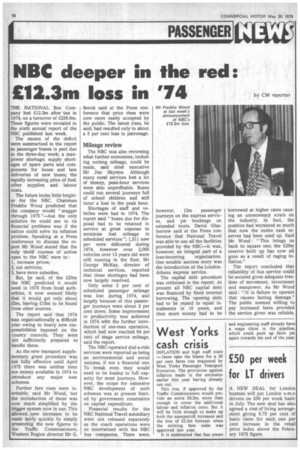NBC deeper in the £12.3m loss in '74
Page 26

If you've noticed an error in this article please click here to report it so we can fix it.
by CM reporter THE NATIONAL Bus Company lost £12.3m after tax in 1974, on a turnover of £226.8m. These figures were revealed in the sixth annual report of the NBC published last week.
The causes of the deficit were summarised in the report as passenger losses in part due to the three-day week; a manpower shortage; supply shortages of spare parts and components for buses and late deliveries of new buses; the rapidly increasing price of fuel, other supplies and labour costs.
The future looks little brighter for the NBC. Chairman Freddie Wood predicted that the company would " stagger through 1975 "—but the only solution he could see to its financial problems was if the nation could solve its inflation problem. Speaking at a Press conference to discuss the report Mr Wood stated that the only three courses of action open to the NBC were to : 1, increase prices; 2, cut services; 3, have more subsidies.
But, he said, of the £20m the NBC predicted it would need in 1975 from local authorities, it now seemed likely that it would get only about £5m, leaving £15m to be found from other sources.
The report said that 1974 was organisationally a difficult year owing to heavy new responsibilities imposed on the county councils. They were not sufficiently prepared to handle these.
As the new transport supplementary grant procedure was not fully effective until April 1975 there was neither time nor money available in 1974 to introduce any major new schemes.
Further fare rises were inevitable, said Mr Wood, but the introduction of these was now much simplified by the trigger system now in use, This allowed new increases to be made fairly quickly by simply presenting the new figures to the Traffic Commissioners. Western Region director Mr G. Brook said at the Press conference that price rises were now more easily accepted by the public. The latest rises, he said, had resulted only in about a 5 per cent loss in patronage.
Mileage review
The NBC was also reviewing what further economies, including cutting mileage, could be made, said chief executive Mr Jim Skyrnie. Although many rural services lost a lot of money, peak-hour services were also unprofitable. Buses could run several journeys full of school children and still incur a loss in the peak hour.
Shortages of staff and vehicles were bad in 1974. The report said " buses due for disposal had to be retained in service at great expense to minimise last mileage in scheduled services "; 1,511 new psv were delivered during 1974, however over 2,000 vehicles over 13 years old were still running in the fleet. Mr George McKay, director of technical services, reported that these shortages had been now largely resolved.
Only some 2 per cent of scheduled passenger mileage was lost during 1974, and largely because of this passenger journeys were about 3 per cent down. Some improvement in productivity was achieved in 1974 with the further introduction of one-man operation, which had now reached 64 per cent of stage service mileage, said the report.
The NBC-operated dial-a-ride services were reported as being an environmental and social success, if not a financial one. To break even they would need to be loaded to full capacity for most journeys. However, the scope for extensive NBC development of such schemes was at present limited by government constraints on capital expenditure.
Financial results for the NBC National Travel subsidiary were not released separately as the coach operations were so intertwined with the NBC bus companies. There were, however, 12m passenger journeys on the express services, and im bookings on extended tours. David Glasborrow said at the Press conference that National Travel was able to use all the facilities provided by the NBC—it was, however, an integral part of a loss-incurring organisation. One notable success story was the introduction of the LondonAthens express service.
The capital debt procedure was criticised in the report. At present all NBC capital debt was financed by fixed interest borrowing. The opening debt had to be repaid in equal instalments in 10 years, and then more money had to be borrowed at higher rates causing an unnecessary grain on the industry. In fact, the position had worsened so much that now the entire cash reserves had been used up. Said Mr Wood : "This brings us back to square one; the £20m reserve built up has now all gone as a result of raging inflation."
The report concluded that reliability of bus service could be secured given adequate freedom of movement, investment and manpower. As Mr Wood said : " It is failure to operate that causes lasting damage." The public seemed willing to pay increased fares provided the service given was reliable.




























































































